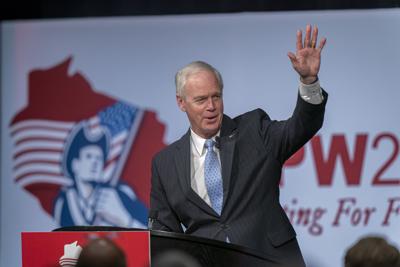Republican U.S. Sen. Ron Johnson, while serving as chairman of the Homeland Security and Governmental Affairs Committee in 2018, declined to subpoena Teva Pharmaceuticals as part of a Democrat-led investigation of the drugmaker’s role in the opioid epidemic. In the months to follow, Teva would donate to both Johnson’s campaign and an affiliated PAC.
The subpoena would have been on behalf of former U.S. Sen. Claire McCaskill, a Missouri Democrat and ranking member of the committee who was leading a probe into several drug manufacturers and distributors exploring the companies’ role in the epidemic.
Teva, an Israeli company, is one of the largest generic drug manufacturers in the world and produced more prescription painkillers during the height of the opioid crisis than more well-known manufacturers like Johnson & Johnson, the New York Times reported.
Late last month, Teva reached a tentative agreement worth up to $4.25 billion to settle a flurry of lawsuits. The state of Wisconsin and some communities in the state will likely see money from that settlement.
McCaskill accused Teva, which was voluntarily providing information as part of her inquiry, of “stonewalling” her work. In May 2018, a spokeswoman for the Israeli drugmaker rejected that claim, telling Stat News the company had “worked with her to give her everything that she’s asked, minus a few things.”
McCaskill asked Johnson to issue a subpoena to Teva to compel the company to produce any omitted information. In a January 2018 letter, the senator from Wisconsin declined to do so, saying he wasn’t convinced the drug manufacturer wasn’t cooperating.
“From what I understand about your interaction with Teva, it appears that the company made a good-faith effort to provide you with information you seek,” Johnson wrote. “According to Teva, the company held ‘numerous conversations’ with your staff in early 2017 about the company’s role in overseeing opioid shipments and preventing diversions, culminating in a 90-minute discussion on July 24, (2017).
Johnson said letters from Teva to McCaskill detailed numerous aspects of the company’s sales tracking systems and how the drugmaker identifies “potentially suspicious orders.
“With the information before me, it is not readily apparent that Teva has declined to cooperate with your inquiry,” Johnson wrote. “Indeed, Teva appears to have spent significant time and resources seeking to address the issues you raised.”
Johnson said “based on this record,” he did not believe the “compulsory process is warranted.”
The senior senator from Wisconsin said McCaskill had not articulated why the information Teva had provided was insufficient, failed to outline what steps she had taken to “mitigate Teva’s confidentiality concerns” and didn’t prove how the materials she sought would “explain Teva’s ‘role in the opioids marketplace.’” He also expressed frustration that McCaskill had “initiated a significant inquiry into the opioid epidemic without seeking to work collaboratively with me.
McCaskill’s investigation seemed to stall after Johnson declined to subpoena Teva — though litigation against the company from numerous states, including Wisconsin, continued.
In the year and a half after the public disagreement between Johnson and McCaskill, Teva’s political action committee made two donations, totaling $3,500, to Johnson’s campaign and an affiliated PAC.
On Dec. 5, 2018, Teva donated $2,500 to Johnson’s leadership PAC, Strategy PAC.
“Leadership PACs are designed for two things: to make money and to make friends, both of which are crucial to ambitious politicians looking to advance their careers,” according to Open Secrets, a nonprofit that tracks data on campaign finance and lobbying. “Leadership PACs are used to fund expenses that are ineligible to be paid by campaign committees or congressional offices. Those costs can include travel to raise a politician's profile, for instance.”
Nine months later, on Sept. 30, 2019, Teva then donated $1,000 directly to Johnson’s campaign
Teva’s PAC almost evenly donates to Republicans and Democrats, an Open Secrets analysis found.
When reached via email with questions about Johnson accepting campaign contributions from a company a member of his committee was investigating, Alexa Henning, a spokesperson for Johnson, said the “senator appreciates the support that people offer, but he doesn’t personally track who gives what, and donations never impact his views on issues or how he votes.”
She also said the Cap Times inquiring about Teva’s contributions to Johnson “is another politically motivated hit job by the corporate media and cheered on by their allies in the Democrat party.”
“If you actually read the senator’s letter to Ms. McCaskill, it lays out his legitimate concerns pretty clearly,” she wrote. “The company in question was already cooperating with Ms. McCaskill voluntarily. It was also part of an ongoing lawsuit tied to the national opioid litigation. Despite Ms. McCaskill’s complaints about ‘lack of cooperation,’ the company held numerous conversations with her staff as well as exchanged correspondence detailing their role in overseeing opioid shipments and preventing diversions like she requested. The senator also agreed to invite Teva to an unrelated hearing at Ms. McCaskill’s request.”
Johnson, who is up for reelection this year, will face Lt. Gov. Mandela Barnes in November in a general election that could determine which party controls the U.S. Senate next year.






